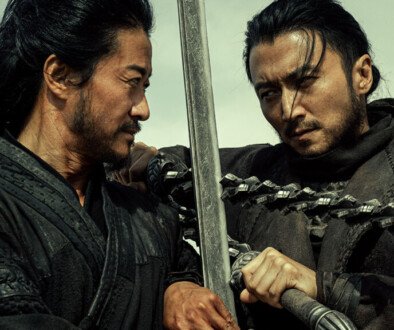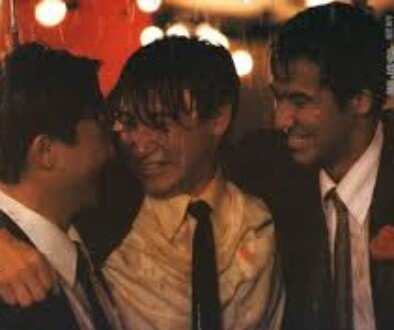NYAFF XXIV Review: In SWING KIDS, Liberation In Every Step
I haven’t seen Thomas Carter’s 1993 movie for proper comparison, although if the trailer for his film is any hint, it could be the case that director Kang Hyoung-chul’s Swing Kids borrows a little bit of notable inspiration for its own treatment.
Set against the backdrop of the Korean War, tensions are high at the Geoje Prison Camp, home to North Korean and Chinese Prisoners of War in 1951. The POWs are split between pro-Communist and anti-Communist factions, coupled with racist friction from the U.S. officers stationed at the camp. It is here we meet recently-pardoned POW Ro Ki-soo (Doh Kyung-soo), endeared for his rebellious attitude and roguish nature.
The camp is also home to Sergeant Jackson (Jared Grimes), a Harlem native often biding his time alone honing his skills as a tap dancer. That all changes when Jackson is assigned by the camp’s brigadier general to assemble a tap-dancing team, ensuing a frenzied audition process that enlists Chinese soldier, Xiaofeng (Kim Min-ho), Byung-sam (Oh Jung-se) who was wrongfully incarcerated while searching for his wife, and Pan-rae (Park Hye-soo), an orphan looking to support her family.
As the story tells it, the team eventually adds Ki-soo, as someone already with a knack for the Kalinka, and enraptured thusly by Jackson’s tap dancing skills in an earlier scene. As the burgeoning team struggles with rehearsals while each tapping into their potential, they must also toe the ideological rift within the camp. More notably, the prolific Ki-soo is forced to trudge the defining line between being a patriot, and pursuing something he loves at the risk of looking like a yankee traitor, while a mole infiltrates the ranks looking to plant seeds of unrest in the camp.
My head was in another space when this film came out in 2018, so suffice it to say, I was pleased to be able to write up this film seeing as Kang is still relevant as of late with superhero adventure, Hi-Five. For this, Kang exudes some of the same rich and enlivening aesthetics in Swing Kids, bolstering with a charismatic cast of actors, brimming with intensity, gravitas, and sheer, lithe musical numbers that’ll have you tapping your feet. Much of this permeates around Ki-soo whose own penchant for change increasingly surfaces in nearly every instance where he’s cornered into putting on an act, even at moments when his loyalty is tested by his comrades. The moments where he’s alone amid some of the film’s impromptu dancing sequences is where he’s the most free.
Jackson is a primary character as well, which makes for one of the most culturally conducive and cohesive choices I’ve seen for an Asian film, as it’s not everyday you see black characters represented in Asian media. It’s also an interesting addendum with the addition of Pan-rae who is fluent in four languages and is able to translate between Jackson and the rest of the team, whereas Kang’s script relies solely on energy, and a colloquial understanding amongst each other, by conveying emotive drama both within, and beyond the barriers of speech. Key moments between Jackson and Ki-soo, and the jovial exchanges between Xiaofeng and Byung-sam are terrific examples of this.
The dance sequences take on a life of their own as well. It’s a little chaotic since there are scenes where the team is performing numbers we don’t see them rehearsing, so there’s no real way to piece things together except through what we see. Narratively, Kang’s script works, as long as it connects thematically between each scene as they’re intended and abstain from losing continuity on message.
Swing Kids wraps things up with some of the most finely-tuned dance numbers you’ll ever see. To that end, it also marks the film’s grand and foreboding send off per Kang’s script where Ki-soo is left having to make the biggest decision of his life, in a scene that proves the strongest bonds we make don’t come from ideology. It’s an impressive touch to a film that doesn’t fall short of the occasional grim reminder that there is a war happening, and in war, people die.
To add, Swing Kids a truly bittersweet film keen on reminding us of the glimmer of hope mankind has had during its darkest times in history, and with a story where one’s sense-of-self can be the most transcending and promising way to live.

Swing Kids enjoyed a Special Screening for the 24th edition of the New York Asian Film Festival.
Native New Yorker. Been writing for a long time now, and I enjoy what I do. Be nice to me!





